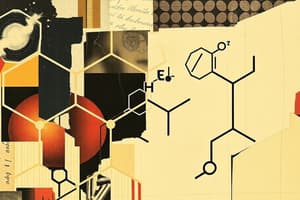Podcast
Questions and Answers
What is the purpose of understanding reaction mechanisms in organic chemistry?
What is the purpose of understanding reaction mechanisms in organic chemistry?
- To determine the molecular weight of compounds
- To study the color changes during reactions
- To predict reaction outcomes and optimize conditions (correct)
- To identify the odor of organic compounds
How does nomenclature contribute to organic chemistry?
How does nomenclature contribute to organic chemistry?
- By predicting the rate of reactions
- By determining the pH of organic compounds
- By providing recommendations for predicting reaction outcomes
- By ensuring unambiguous communication and recording of chemical information (correct)
What distinguishes isomers of organic compounds?
What distinguishes isomers of organic compounds?
- Their color
- Their odor
- Their molecular weight
- Their arrangement of atoms (correct)
What are the three main types of hydrocarbons based on the presence of carbon-carbon double and triple bonds?
What are the three main types of hydrocarbons based on the presence of carbon-carbon double and triple bonds?
Which organization provides recommendations for naming organic compounds?
Which organization provides recommendations for naming organic compounds?
Which of the following groups is known for imparting characteristic chemical properties and reactivity to organic molecules?
Which of the following groups is known for imparting characteristic chemical properties and reactivity to organic molecules?
How do factors like thermodynamics and transition states contribute to reaction mechanisms?
How do factors like thermodynamics and transition states contribute to reaction mechanisms?
Isomers are molecules that have the same molecular formula but differ in what aspect?
Isomers are molecules that have the same molecular formula but differ in what aspect?
What is the significance of understanding isomerism in organic chemistry?
What is the significance of understanding isomerism in organic chemistry?
What types of isomerism are commonly exhibited by organic compounds?
What types of isomerism are commonly exhibited by organic compounds?
Which of the following is classified as a functional group in organic chemistry?
Which of the following is classified as a functional group in organic chemistry?
What do functional groups like alcohols and carboxylic acids enable us to do with organic molecules?
What do functional groups like alcohols and carboxylic acids enable us to do with organic molecules?
Flashcards are hidden until you start studying
Study Notes
Discovering the World of Organic Chemistry
Organic chemistry, the study of carbon-based compounds, is a vibrant and expansive field that delves into the synthesis, structure, reactivity, and applications of organic molecules. Central to this discipline are several essential concepts and subtopics, each contributing to our understanding of organic chemistry's richness and complexity.
Hydrocarbons: Laying the Foundation
Hydrocarbons serve as the fundamental building blocks of organic chemistry, comprising only carbon and hydrogen atoms. They are classified as alkanes (saturated), alkenes (unsaturated), and alkynes (doubly unsaturated) based on the presence and number of carbon-carbon double and triple bonds.
Functional Groups: Providing Reactivity
Functional groups are specific patterns of atoms and bonds within a molecule that impart characteristic chemical properties and reactivity. Common functional groups include alcohols (OH), carboxylic acids (COOH), amines (-NH2), and halogens (halides, X). These functional groups foster a wide range of chemical reactions, allowing us to synthesize and manipulate organic molecules.
Isomerism: A Twist in Structure
Isomers are molecules with the same molecular formula but different structural arrangements of atoms, resulting in differences in physical properties and reactivity. Organic compounds exhibit several types of isomerism, including structural, positional, and functional group isomerism.
Reaction Mechanisms: Unraveling the Chemistry
To understand organic chemistry's transformations, it's essential to comprehend reaction mechanisms, which reveal the step-by-step molecular changes during a chemical reaction. Factors such as reaction kinetics, thermodynamics, and transition states all contribute to reaction mechanisms, allowing chemists to predict reaction outcomes and optimize conditions.
Nomenclature: Giving Molecules a Name
Organic molecules are named according to a set of rules known as nomenclature. The International Union of Pure and Applied Chemistry (IUPAC) provides recommendations for naming organic compounds, which allow for unambiguous communication and recording of chemical information.
Isomers and Nomenclature
Isomers can have different names depending on their structure. For example, 1-bromo-2-methylbutane and 2-bromo-1-methylbutane have the same molecular formula (C5H11Br) but different arrangements of atoms, leading to different names.
In summary, organic chemistry offers a diverse and stimulating landscape for exploration, discovery, and application. By understanding hydrocarbons, functional groups, isomerism, reaction mechanisms, and nomenclature, we can harness the power of organic chemistry to develop innovative materials, medicine, and technology.
Studying That Suits You
Use AI to generate personalized quizzes and flashcards to suit your learning preferences.




